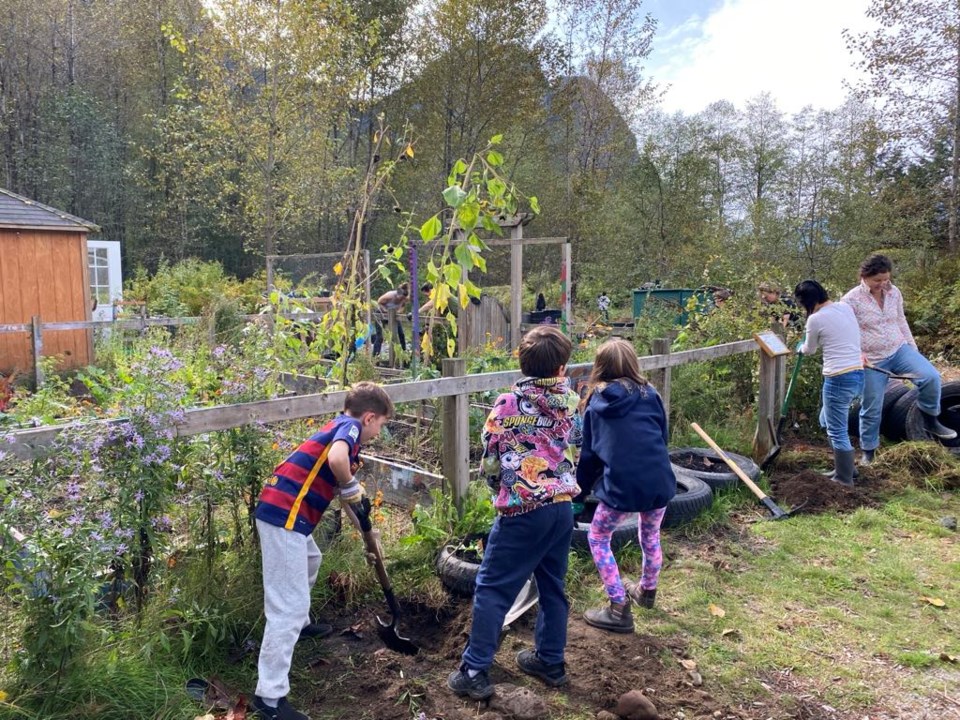Over 35 parents, students, and staff gathered last weekend for Valleycliffe Elementary’s annual Outdoor Classroom Stewardship Day, an event aimed at maintaining and enhancing the school’s outdoor learning space.
Raakel Toppila, parent advisory council (PAC) co-chair, who has been involved with the school for two years, played a key role in organizing the event.
"When I joined the PAC, I was looking for a role that aligned with my passion for outdoor education and getting children outside more often," said Toppila.
"We organize two stewardship events each year—one in the spring and one in the fall. We tend to the gardens and the outdoor classroom space, doing tasks like planting, removing invasive species, mulching, weeding, and trimming. It’s all about taking care of this amazing resource the school already has."
The stewardship day is a tradition at Valleycliffe, continuing the efforts of a previous parent who initiated the seasonal clean-up events before moving out of the province.
"It’s actually a continuation of what a previous parent started," Toppila said. "She used to organize these events in the spring and fall, and I picked up where she left off."
This year, the event had additional significance, with funding secured for the introduction of new plants.
"Sarah McJannet, a planner with the District of Squamish, applied for a grant on behalf of the school to obtain plants for both the new daycare area and the outdoor classroom," said Toppila.
"Linda Peterson, one of the teachers, acquired the native plants from North Vancouver. Planting those species was a big focus of our activities this time."
Valleycliffe gets its hands dirty
Reintroducing native plants, Toppila noted, is crucial for multiple reasons. "Our focus is on increasing biodiversity in the outdoor classroom, which is important given the environmental destruction we see around us. We’re trying to enhance the habitat, provide food for birds, and support pollinators like bees and insects."
The reintroduction of native plants is part of an effort to restore biodiversity in the area. Many plants that were once common in Squamish, like Western redcedar, salal, and sword fern, have been lost due to colonization and land clearing.
Ethnobotanist Nancy Turner noted in a 2003 study that these plants "were integral not only to the environment but to the cultural practices of Indigenous peoples" in British Columbia, and their loss has had a lasting impact on the region’s biodiversity.
Planting roots, growing minds
The event is not just about beautification, but also education, according to Toppila.
"Many people, including students, aren’t familiar with the native plants in the area. We plan to label the plants so that people who visit the outdoor classroom can learn more—like recognizing a beaked hazelnut or a black hawthorn," she said.
Interpretive signs already in place help educate visitors on the traditional uses of these plants by Indigenous communities, deepening the connection between nature and cultural heritage.
For Toppila, the biggest highlight of the day was seeing the growing participation from the school community. "We had over 35 participants this year, maybe even more. It shows that the school community really values this space and wants to take care of it," she said. "That, for me, was the most exciting part—seeing that it’s a collective effort by the whole school community."
The atmosphere, according to Toppila, was positive and welcoming. "Everyone was happy working together, with lots of conversations happening. It was also a great opportunity for people to get to know each other, especially for new parents who just joined the school community this year."
Branching out: School’s need for a new shelter
Now, the school dreams of building a shelter for the outdoor space.
"One of our goals right now is to build a shelter in the outdoor classroom," she said. "We want to create a space where students can gather outdoors even in rainy or very hot weather, so that outdoor education can continue year-round. We’ve already fundraised over $60,000, but shelters are expensive, and many other schools already have them. We are one of the last, I think."
Toppila’s message for the community was simple.
"I just want to encourage people to get outside more and enjoy nature. Take notice of your surroundings and appreciate the beauty that’s all around us."
For more information on how to support Valleycliffe Elementary’s outdoor classroom initiatives, visit their Facebook group
Bhagyashree Chatterjee is The 麻豆社国产’s Indigenous affairs reporter. This reporting beat is made possible by the




